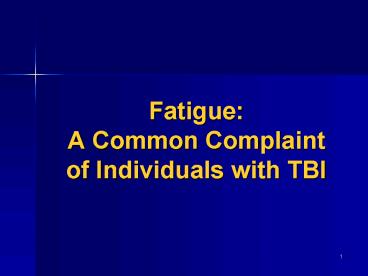Fatigue: A Common Complaint of Individuals with TBI - PowerPoint PPT Presentation
1 / 29
Title:
Fatigue: A Common Complaint of Individuals with TBI
Description:
75% of TBI (n = 223) had significant fatigue as opposed to 40% of controls (n = 85) ... JFK Johnson Rehabilitation Institute. Kessler Medical Rehabilitation and ... – PowerPoint PPT presentation
Number of Views:37
Avg rating:3.0/5.0
Title: Fatigue: A Common Complaint of Individuals with TBI
1
Fatigue A Common Complaint of Individuals with
TBI
2
Wayne A. Gordon, Ph.D. Jack Nash
Professor Department of Rehabilitation
Medicine Mount Sinai School of Medicine Mount
Sinai Medical Center New York, NY E-mail
wayne.gordon_at_mssm.edu Website www.tbicentral.org
This presentation is supported by Grant No.
H133A02501, National Institute on Disability and
Rehabilitation Research.
3
- More than 70 of those studied by Olver et al,
1996 complained of fatigue up to 5 years
4
- LaChapelle et al, 1998 reported that many
individuals with TBI report that fatigue is their
most disabling symptom
5
Why are individuals with TBI fatigued?
- It has been suggested that more mental effort is
needed to get the job done (VonZomeron, 1984)
6
Why are individuals with TBI fatigued?
- Zino et al, 2006 and Riese et al, 1999 have
reported that the blood pressure of individuals
with TBI increased while they were performing
cognitive tasks
7
- Given the importance of this issue in the last
funding cycle (2002-2007) 3 TBI model
systems independently examined Post-TBI Fatigue
(PTBIF) - Santa Clara Valley Medical Center
- Craig Hospital
- Mount Sinai Medical Center
8
- The findings of these research projects were
published in the January 2008 issue of JHTR
9
Fatigue over time
- SCVMC examined a group of individuals at 1 and 2
years post-injury and found that levels of
fatigue ranged between 23 and 61 depending on
the measure used - These values were stable between years 1 and 2
10
Fatigue over time
- They also reported some decrease in fatigue in
the first year post-injury that increased again
between 18 and 24 months post-injury
11
The Mount Sinai group examined two issues
- The relationship between fatigue and cognitive
performance - The relationship between fatigue and participation
12
Fatigue and cognition
- The relationship between fatigue and cognitive
performance examined by creating a cognitive
challenge and comparing the response of
individuals with TBI (n 202) and non-disabled
individuals (n 73)
13
Fatigue and cognition
- Evaluation lasted on average 4.5 hours and
consisted of two administrations of 6 subtests
taken from the CANTAB (double baseline) - Followed by a third administration about two
hours later - In between the second and third administration
the person was given paper and pencil tasks
14
Fatigue and cognition
- Changes in performance on the CANTAB was viewed
as a measure of objective fatigue - Situational fatigue was based by a 7 point rating
of fatigue on a Likert scale - Day-to-day fatigue was measured by scores on
the GAF
15
Fatigue and cognition
- In order to reduce the number of variables CANTAB
was factor analyzed and three factors emerged - Speed
- Accuracy
- Executive function
16
Fatigue and cognition
- Individuals with TBI did poorer than ND on the
CANTAB and were also more fatigued
17
Fatigue and cognition
- On the speed factor scores the ND became faster
indicating that they were benefiting from
practice - Those in the TBI group remained stable across
administration indicating no benefits from
practice
18
Fatigue and cognition
- In terms of accuracy, individuals with TBI made
more errors over time - Those in the ND group remained constant
- No change on executive function scale in either
group
19
Fatigue and cognition
- Speed was associated with situational fatigue at
all points in time in the TBI group but not in
the controls - Day-to-day fatigue (GAF score) was related to
speed at T1 and T3 in the TBI group but not the
controls - In the control group those who were more fatigued
experienced a greater decline in their speed
20
Fatigue and cognition
- These findings suggest that different patterns of
cognitive performance are associated with fatigue
in individuals with TBI and controls - Response speed decrease as the cognitive demands
increase
21
Fatigue and participation
- 75 of TBI (n 223) had significant fatigue as
opposed to 40 of controls (n 85)
22
Fatigue and participation
- The relationship between fatigue (GFI), pain,
sleep and depression was examined by eliminating
items from the non-fatigue scales that overlap
with the GFI, i.e., fatigue - TBI had higher levels of depression, pain, poorer
sleep quality and health related quality of life
23
Fatigue and participation
- In predicting fatigue it was found that sleep
quality, pain and depression accounted for 58 of
the variance in the controls and 23
24
Fatigue and participation
- GFI scores were not correlated with measure of
participation - Fatigue did not appear to limit what folks were
doing
25
Fatigue and treatment
- The group at Craig examined the utility of
modafinil as a treatment for fatigue defined as
daytime sleepiness - There was no clear benefit of the drug over
placebo!
26
Future plans
- Collaborative study on post-TBI insomnia
involving four other TBI model systems - Carolinas Rehabilitation
- JFK Johnson Rehabilitation Institute
- Kessler Medical Rehabilitation and Research
Center - Santa Clara Valley Medical Center
27
Future Plans
- Study will examine insomnia in individuals at 1
and 2 years post injury and 2 and 5 years
post-injury
28
Future Plans
- Mount Sinai is also studying the utility of
exercise as a treatment for post-TBIF
29
(No Transcript)































